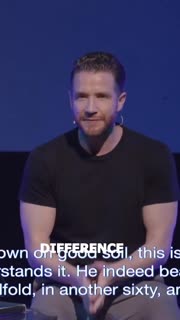Equipped for Unity: Living Out God's Grace
Devotional
Sermon Summary
Bible Study Guide
Sermon Clips
### Quotes for Outreach
1. "The difference in you being fruitful in your life is are you hearing and are you understanding the word of God? Or, are you hearing it and not understanding it and you're shaving with the dull side of a razor blade? Ill-equipped." [04:42] (16 seconds)
2. "It is hearing and it is understanding the word of God that equips you for the work that God has set out for you to do. And way too many Christians in this world are not effective because they're not hearing. And they're not understanding the word of God. And so they're going out into the world not equipped correctly for what God wants them to do." [05:26] (21 seconds)
3. "The answer is not trying to love yourself more. The answer is receiving God's love and realizing that you are already so loved in him. Receiving God's love and out of the overflow of that, live your life. It's not about I need to love myself more. That's not the purpose of that passage." [10:16] (18 seconds)
4. "For it is by grace that you have been saved through faith. It's not from yourselves. It is the gift of God, not by work so that no one can boast. So this tells us that salvation is not an achievement to be earned. It is a gift to be received." [18:42] (15 seconds)
5. "You were not saved by good works. You were saved for good works. There is stuff that God has created in advance that you need to do, and you need to be thoroughly equipped for that." [23:48] (11 seconds)
### Quotes for Members
1. "There's a huge problem in the world today when it comes to understanding the word of God. Theologians call this exegesis versus eisegesis. This is two opposite approaches to reading the Bible. If you've been around church for a while, you've probably heard the word exegete or exegesis or exegetical. It means to draw out. So when you draw out, you're not going to be able to understand the word of God. If you look at the Bible and you exegete the Bible, it means you try to understand who said it, who was it to, what did they say, what did they mean? You pull out the meaning. And when you discover the meaning of the text, then you apply that to your life." [06:08] (34 seconds)
2. "The biggest mistake I hear today in exegesis is from Mark 12, when it's Jesus giving the greatest commandment. He says, you shall love the Lord your God with all your heart, soul, mind, and strength and love your neighbor as yourself. I hear so many Christians, even pastors read this verse and say the point of this verse is that you can't love others if you don't love yourself. And so you need to love yourself more. That is the entire point of this verse. The entire goal of this verse is love yourself, love yourself, love yourself. The problem with that is that love in the Bible is not a feeling, it is an action." [08:22] (35 seconds)
3. "The whole point of this chapter is that you were dead, but God made you alive. And that you now have access to God and you are a special part of God's family. We have a photo of the Western Wall. I went to Jerusalem a number of years ago. This is the Western Wall. The old temple in Jerusalem was leveled by the Romans when they rebelled in 70 AD. So the temple's somewhere on the other side of that wall. So the Jews will go to Jerusalem or they'll go visit and they get as close to the wall as they possibly can to pray. Because they think that they are as close as they can possibly be to where the presence of God was or is. And so they go there thinking, God will hear me more if I'm closer to the temple. have access to God today because of Jesus." [35:40] (52 seconds)
4. "The word new in the Greek, the normal, the normal, the normal word is neos, which we got a photo of a minivan. How many of you want to drive that? I didn't see one hand go up. One hand. Jeff. So if you're driving that minivan and you're like, this thing is getting old. I need a new minivan. I need an upgraded model. That's the word neos. It means newer or younger. That's not the word Paul uses though. He uses the word kynos, which means completely fresh in development. Not an existing improvement of the old. It is a brand new. So this would be like, getting a helicopter. You trade your minivan in and you get one of these. It's not an upgrade of the existing. It is a brand new development, an entirely new mode of transportation. God did not come to upgrade Jewish culture or Greek culture. He came to establish kingdom culture, his culture, and in one body to reconcile both of them to God through the cross, by which he put to death their hostility." [31:08] (69 seconds)
5. "The Jews viewed it as there's the Jews, and then there's the Gentiles. And there's everybody else. The Greeks viewed it as there's the Greeks and the barbarians. It is us versus them. It is me and mine against everybody else. This is the way those two groups viewed the world. It's easy to kind of make fun of them today, but how much do we do this in our culture? Are you vaccinated? Are you unvaccinated? Are you a Republican? Are you a Democrat? It's me against you. It's mine and my ideology. And then we demonize other groups of people. And I'm not saying we shouldn't stand up for biblical values. I'm just saying we shouldn't demonize people who are different than us." [25:30] (46 seconds)
Ask a question about this sermon
1. "The difference in you being fruitful in your life is are you hearing and are you understanding the word of God? Or, are you hearing it and not understanding it and you're shaving with the dull side of a razor blade? Ill-equipped." [04:42] (16 seconds)
2. "It is hearing and it is understanding the word of God that equips you for the work that God has set out for you to do. And way too many Christians in this world are not effective because they're not hearing. And they're not understanding the word of God. And so they're going out into the world not equipped correctly for what God wants them to do." [05:26] (21 seconds)
3. "The answer is not trying to love yourself more. The answer is receiving God's love and realizing that you are already so loved in him. Receiving God's love and out of the overflow of that, live your life. It's not about I need to love myself more. That's not the purpose of that passage." [10:16] (18 seconds)
4. "For it is by grace that you have been saved through faith. It's not from yourselves. It is the gift of God, not by work so that no one can boast. So this tells us that salvation is not an achievement to be earned. It is a gift to be received." [18:42] (15 seconds)
5. "You were not saved by good works. You were saved for good works. There is stuff that God has created in advance that you need to do, and you need to be thoroughly equipped for that." [23:48] (11 seconds)
### Quotes for Members
1. "There's a huge problem in the world today when it comes to understanding the word of God. Theologians call this exegesis versus eisegesis. This is two opposite approaches to reading the Bible. If you've been around church for a while, you've probably heard the word exegete or exegesis or exegetical. It means to draw out. So when you draw out, you're not going to be able to understand the word of God. If you look at the Bible and you exegete the Bible, it means you try to understand who said it, who was it to, what did they say, what did they mean? You pull out the meaning. And when you discover the meaning of the text, then you apply that to your life." [06:08] (34 seconds)
2. "The biggest mistake I hear today in exegesis is from Mark 12, when it's Jesus giving the greatest commandment. He says, you shall love the Lord your God with all your heart, soul, mind, and strength and love your neighbor as yourself. I hear so many Christians, even pastors read this verse and say the point of this verse is that you can't love others if you don't love yourself. And so you need to love yourself more. That is the entire point of this verse. The entire goal of this verse is love yourself, love yourself, love yourself. The problem with that is that love in the Bible is not a feeling, it is an action." [08:22] (35 seconds)
3. "The whole point of this chapter is that you were dead, but God made you alive. And that you now have access to God and you are a special part of God's family. We have a photo of the Western Wall. I went to Jerusalem a number of years ago. This is the Western Wall. The old temple in Jerusalem was leveled by the Romans when they rebelled in 70 AD. So the temple's somewhere on the other side of that wall. So the Jews will go to Jerusalem or they'll go visit and they get as close to the wall as they possibly can to pray. Because they think that they are as close as they can possibly be to where the presence of God was or is. And so they go there thinking, God will hear me more if I'm closer to the temple. have access to God today because of Jesus." [35:40] (52 seconds)
4. "The word new in the Greek, the normal, the normal, the normal word is neos, which we got a photo of a minivan. How many of you want to drive that? I didn't see one hand go up. One hand. Jeff. So if you're driving that minivan and you're like, this thing is getting old. I need a new minivan. I need an upgraded model. That's the word neos. It means newer or younger. That's not the word Paul uses though. He uses the word kynos, which means completely fresh in development. Not an existing improvement of the old. It is a brand new. So this would be like, getting a helicopter. You trade your minivan in and you get one of these. It's not an upgrade of the existing. It is a brand new development, an entirely new mode of transportation. God did not come to upgrade Jewish culture or Greek culture. He came to establish kingdom culture, his culture, and in one body to reconcile both of them to God through the cross, by which he put to death their hostility." [31:08] (69 seconds)
5. "The Jews viewed it as there's the Jews, and then there's the Gentiles. And there's everybody else. The Greeks viewed it as there's the Greeks and the barbarians. It is us versus them. It is me and mine against everybody else. This is the way those two groups viewed the world. It's easy to kind of make fun of them today, but how much do we do this in our culture? Are you vaccinated? Are you unvaccinated? Are you a Republican? Are you a Democrat? It's me against you. It's mine and my ideology. And then we demonize other groups of people. And I'm not saying we shouldn't stand up for biblical values. I'm just saying we shouldn't demonize people who are different than us." [25:30] (46 seconds)










